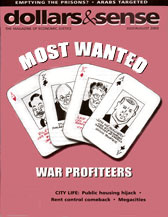Harvard Students Demand Alternative Economics
This article is from the July/August 2003 issue of Dollars and Sense: The Magazine of Economic Justice available at http://www.dollarsandsense.org

This article is from the July/August 2003 issue of Dollars & Sense magazine.
Subscribe Now
at a discount.

Teaching economics
Resources
and links
At Harvard, the economics department has long offered just one introductory economics course. The class, known as "Ec10," is a prerequisite for economics and social studies majors and the only basic primer on economics available on campus. Since 1984, the course has been taught exclusively by tenured professor Martin Feldstein, a former economic adviser to Ronald Reagan and current head of the National Bureau of Economic Research.
Feldstein's course is centered around N. Gregory Mankiw's textbook and a supplementary sourcebook of articles from newspapers and magazines. The articles are heavily biased to the right, with over 15% of them penned by Feldstein himself. The section on "Income Distribution" features articles titled, "A Welfare-to-Work Success Story" and "Guess What? Welfare Reform Works!"
Over the past year, a group of about 10 undergraduates at Harvard organized for an alternative economics course. The students, members of the campus organization Students for a Humane and Responsible Economics (SHARE), demanded a more diverse introduction to economics than is provided by Feldstein's "Ec10."
Also see From the Classroom to the White House in this issue.
They argued that Feldstein's approach to economics reflects and reinforces a right-wing political agenda. His readings support tax cuts for the rich, the privatization of Social Security, and the notion of a "natural" rate of unemployment, and they blame the poor for their poverty. Given that "Ec10" is the largest course at Harvard—about 750 students take it each year, and nearly half of Harvard undergraduates will have taken the class before they graduate—it has a particularly powerful influence on campus debates and beyond.
During a three-week student living wage sit-in in 2001—when students took over an administrative building to demand a living wage for all Harvard workers—Mankiw was a public opponent of the campaign. In the wake of the sit-in, he wrote a Boston Globe article arguing that a living wage would hurt workers. (In reality, the living wage has only improved the living standards and bargaining power of Harvard workers.) Feldstein still assigns the article. In fact, Mankiw's is the only article on the topic included in the sourcebook, even though the Globe had run a pro-living wage editorial opposite Mankiw's. When students confronted him about this at a SHARE forum earlier this year, Feldstein claimed that he didn't realize his course presented only one side of the issue.
SHARE's petition for an alternative course garnered over 700 signatures in only a few weeks. Despite this, the economics department refused to approve the alternative class proposed by radical economist and tenured professor Stephen A. Marglin. In May, Harvard's core curriculum office granted Marglin permission to teach the class next year, but the credits will not count as a replacement for "Ec10" for economics majors. Nevertheless, the launch of this new course represents a victory for SHARE.
The conservative ascendancy within economics serves to indoctrinate undergraduates politically. Critical perspectives on economics are key to countering the rise of political conservatism on campuses—and to informing radical, anti-corporate, and anti-capitalist student movements. Hopefully, the push for alternative economics education will continue at Harvard and at campuses across the country.
